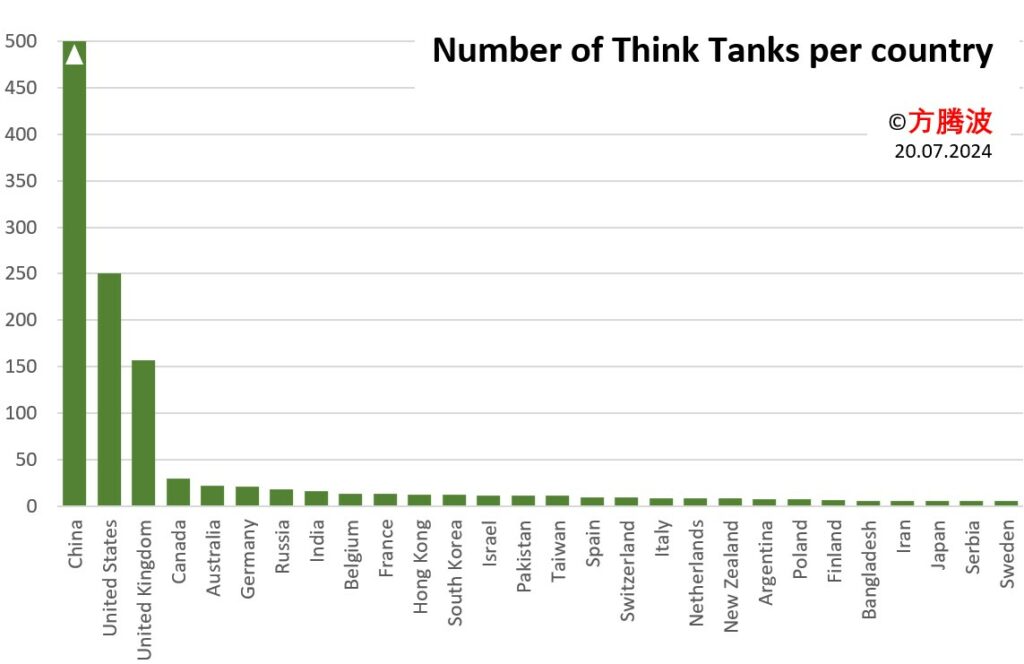Views: 301
A Comparative Study of Think Tanks in China and the World.
Frans Vandenbosch 方腾波 21.07.2024

.
Think tanks are crucial in shaping public policy and strategic planning worldwide. This article compares the distinctive roles and challenges of think tanks in China with those in other countries. By exploring their funding, structure, and influence, we reveal unique insights into their operations. The study emphasizes the importance of transparency and ethics for maintaining credibility. Through this comparison, we aim to enhance understanding of the global think tank landscape.
What is a think tank ?
The expression “think tank” (or policy institute) is usually defined as follows:
· A group or institution organized for intensive research and solving of problems, especially in the areas of technology, social or political strategy, or armament.
· A group of people who collectively perform research and develop reports and recommendations on topics relating to strategic planning or public policy, and which is usually funded by corporate, government, or special interests.
A NGO, MPO, foundation, trust, Stiftung, endowment or other charity organisation is not a think tank, although some of these organizations often sponsor a think tank. The list of the 50 wealthiest foundations in the world is here.
Funding and purpose
There is absolutely nothing wrong with a think tank sponsored by a government (with tax money), whether it is Chinese or American. Neither is there anything wrong or unethical if a think tank is funded by a private corporation or a group of private people or volunteers.
However, things go terribly wrong when a think tank is funded for the sole purpose of serving the interests of a single person and using unauthorized means to do so. It is unacceptable for a think tank to undermine the social cohesion of society and thus serve interests other than those of the majority of the population. And things go even further wrong when a think tank not only publishes reports on their activities but also pays lobbyists to push their views into the media, politics or education. It is highly unethical when a think tank takes matters into its own hands to bend society to its will and thereby takes the decision-making power out of the hands of the elected politicians. Often the language used in think tank reports is an indication of the sincerity of the think tank’s members. The general “follow the money” rule is a useful rule of thumb for examining the sincerity of a think tank.
Global overview of think tanks
There are at least 1000 think tanks spread over more than 60 countries.
The graph here below is an overview of the number of think tanks in 30 countries with 5 or more think tanks.

Source: Robert Bosch Stiftung, MERICS, CCG, Wikipedia
Let’s compare the number, the quality and the purpose of the think tanks in the current two biggest economies of this globe: China and the USA:
China
China is focusing on quality, not on quantity. In China, there is a system in place to evaluate the quality of think tanks, similar to the system to compare the quality of the universities and higher education institutes.
So far, there are two batches of 29 high-end think tanks selected for the national high-end think tank construction pilot list. The first batch of 25 was selected in December 2015. The list was later reduced to 24 due to the reform of national institutions. The second batch with 5 additional think tanks was announced in March 2020. Source: [1]
| The first category consists of comprehensive research institutions directly under the CPC Central Committee, the State Council, and the Central Military Commission | |
| 1 | Development Research Center of the State Council |
| 2 | Chinese Academy of Social Sciences |
| 3 | Chinese Academy of Sciences |
| 4 | Chinese Academy of Engineering |
| 5 | Central Party School |
| 6 | National School of Administration |
| 7 | Central Compilation and Translation Bureau |
| 8 | Xinhua News Agency |
| 9 | Academy of Military Science |
| 10 | National Defence University. |
| The second category are professional think tanks formed by relying on universities and research institutions | |
| 1 | National Finance and Development Laboratory of the Chinese Academy of Social Sciences |
| 2 | National Global Strategy Think Tank of the Chinese Academy of Social Sciences |
| 3 | China Institute of Contemporary International Relations |
| 4 | Macroeconomic Research Institute of the National Development and Reform Commission |
| 5 | Institute of International Trade and Economic Cooperation of the Ministry of Commerce |
| 6 | National Development Research Institute of Peking University |
| 7 | Institute of National Conditions of Tsinghua University |
| 8 | National Development and Strategy Institute of Renmin University of China |
| 9 | China Research Institute of Fudan University |
| 10 | Institute of International Law of Wuhan University |
| 11 | Guangdong, Hong Kong and Macao Development Research Institute of Sun Yat-sen University |
| 12 | Shanghai Academy of Social Sciences. |
| The third category consists of professional research institutions of state-owned enterprises | |
| 1 | China Petroleum Economic and Technical Research Institute. |
| The fourth category are social think tanks with a relatively good foundation. | |
| 1 | China Center for International Economic Exchanges |
| 2 | China Institute for Comprehensive Development (Shenzhen). |
| The five newly selected national high-end think tank construction pilot units in the second batch | |
| 1 | China Institute of International Studies of the Ministry of Foreign Affairs |
| 2 | China Academy of Fiscal Sciences of the Ministry of Finance |
| 3 | China Institute of Science and Technology for Development Strategy of the Ministry of Science and Technology |
| 4 | Institute of China Education and Social Development of Beijing Normal University |
| 5 | Research Center for Regional Coordinated Development of Zhejiang University. |
Additional to the 29 high-end think tanks, there are 18 selected think tank networks established or co-established by Chinese entities:
| 1 | Belt and Road Studies Network |
| 2 | BRICS Think Tank Network for finance |
| 3 | China Council for BRICS Think-tank Cooperation (CCBTC) |
| 4 | Silk Road Think Tank Network |
| 5 | EU-China think tank exchanges |
| 6 | Hainan free trade port-ASEAN Think Tank alliance |
| 7 | Economic Think Tank Alliance of the Shanghai Cooperation Organization |
| 8 | China Africa Think Tank Forum |
| 9 | China and Globalization Forum |
| 10 | China Global Think Tank Innovation Forum |
| 11 | Belt and Road think tank cooperation alliance |
| 12 | China-LAC Think-Tanks Forum |
| 13 | China-Thailand Think Tank High-end Dialogue Forum |
| 14 | CICA Institute/CICA Think Tank Forum |
| 15 | APEC Energy Think Tank Forum |
| 16 | Southeast Asia Think Tank Forum |
| 17 | Building a Community with Shared Future – International Think Tank Forum |
| 18 | Silk Road International Think Tank Exchange Center |
Source: [2]
Add to our list the think tanks of the 8 minor political parties of China:
| Party | Year founded | Members in 2022 | Chairperson | |
| Name in English | 政党中文名称 | |||
| Revolutionary Committee of the Chinese Kuomintang (RCCK) | 中国国民党革命委员会 (民革) Zhōngguó Guómíndǎng Gémìng Wěiyuánhuì (Míngé) | 1948 | 158 000 | Zheng Jianbang 郑建邦 |
| China Democratic League (CDL) | 中国民主同盟 (民盟) Zhōngguó Mínzhǔ Tóngméng (Mínméng) | 1941 | 348 300 | Ding Zhongli 丁仲礼 |
| China National Democratic Construction Association (CNDCA) | 中国民主建国会 (民建) Zhōngguó Mínzhǔ Jiànguó Huì (Mínjiàn) | 1945 | 220 000 | Hao Mingjin 郝明金 |
| China Association for Promoting Democracy (CAPD) | 中国民主促进会 (民进) Zhōngguó Mínzhǔ Cùjìn Huì (Mínjìn) | 1945 | 192 000 | Cai Dafeng 蔡达峰 |
| Chinese Peasants’ and Workers’ Democratic Party (CPWDP) | 中国农工民主党 (农工党) Zhōngguó Nónggōng Mínzhǔdǎng (Nónggōngdǎng) | 1930 | 192 000 | He Wei 何维 |
| China Zhi Gong Party (CZGP) | 中国致公党 (致公党) Zhōngguó Zhì Gōng Dǎng (Zhìgōngdǎng) | 1925 | 69 000 | Jiang Zuojun 蒋作君 |
| Jiusan Society (JS) | 九三学社 Jiǔsānxuéshè | 1945 | 204 069 | Wu Weihua 武维华 |
| Taiwan Democratic Self-Government League (TDSL) | 台湾民主自治同盟 (台盟) Táiwān Mínzhǔ Zìzhì Tóngméng (Táiméng) | 1947 | 3 400 | Su Hui 苏辉 |
| Total | 1 386 769 |
These are just the top level think tanks. As per a German Robert Bosch Stiftung report of 08.05.2024, more than 1900 think tanks are active in China, all contributing to policy deliberation and promotion; they are key to party-state policy making and communication. The Robert Bosch Stiftung has been working and cooperating with think tanks globally in different contexts and various constellations for decades.
The development challenges of Chinese think tanks are: [3]
- Lack of top talent in think tanks
- Challenges brought by new media
- Challenges of the big data era and AI
- Competition from consulting firms
- Organizational adjustments and transformation
- Insufficient brand credibility
- Disadvantageous position in the international discourse
In short: Chinese think tanks are working hard, have high quality standards, have a very good reputation in China but have a long way to go in brand marketing and international positioning.
United States
In the United States, there is an abundance of think tanks:
| 142 | Domestic think tanks of all colours and types: conservative, centre-right, independent, nonpartisan, centre-left, progressive, liberal, libertarian. |
| 73 | Think tanks on international relations and security |
| 24 | Think tanks on science, technology, environment. |
| 11 | Think tanks on arts and humanities |
I strongly suspect that in the US, there must be more than the 250 think tanks listed on Wikipedia.
The think tanks in the US have not implemented a KPI or quality standards system.
Of the 73 think tanks on international relations and security in the US, few reject American exceptionalism. For American think tanks, the question is not whether to lead the world, but how to do so. To that end, almost all of these American foreign policy think tanks have offices in Brussels, Geneva, Tokyo and other decision-making centres, where they send their lobbyists to manipulate the policies of the American puppet states.
Some of the 72 think tanks on international relations and security have deceptive or disguised names. Think tanks with “peace” in their name often have very different goals than peace for the people of this world. The USIP, United States Institute of Peace for example is a promotor of the US “constructive ambiguity”, actually destructive ambiguity.[4] The bulk of the current Biden administration advisors are from the USIP.
An assessment report on the financial transparency of major think tanks and lobbying groups around the world shows that the United States Institute of Peace (USIP), and the Open Society Foundations (OSF, George Soros), rank very low in terms of the degree of openness of funding sources. Transparify, a non-profit organization based in Georgia, said that disclosing funding sources can improve the credibility of think tank research results and avoid being criticized for being non-objective and biased, and “taking money to speak for others”. In 2014, 80% of the American think tanks and lobbying groups were listed as opaque in terms of funding sources.
Among the 43 American think tanks and lobbying groups listed in the Transparify report,[5] the think tanks with the highest transparency rankings include the Center for Global Development, the Pew Research Center and the Woodrow Wilson International Center for Scholars, which are rated “five stars”; while the Open Society Foundations (Soros) ranked last for the third consecutive year, with no stars, and Human Rights Watch and the United States Institute of Peace got only two stars. The latter two human rights groups provide little or no financial information.
The new Committee on the Present Danger: China (CPDC) is a is a think tank and an American foreign policy interest group who perceive China as a treat to the American global hegemony. The CPDC suddenly started to revive after the approval of the “China Competition 2.0” bill, approved by the US congress in February 2022. The 500 million USD of the China Competition 2.0 act has now, with the “Countering Chinese Influence Fund” increased to 1.5 billion USD over a five-year period. While the U.S. Agency for Global Media (USAGM) receiving the bulk of the money, many ‘smaller’ entities, including the CPDC, are eagerly eating from that money pot.
The main purpose is to set up local foreign outlets and programs to train foreign journalists to demonize China.. The CPDC has a steering committee of more than 50 people, the core members are Frank Gaffney, Vice Chairman, Steve Bannon, Steven W. Mosher, author of A Mother’s Ordeal[6] , Gordon Chang, author of The Coming Collapse of China[7]
The CPDC has been criticized as promoting a revival of Red Scare and Yellow Peril politics in the United States and abroad, also for the involvement of dark underworld figures as Steve Bannon, Frank Gaffney and others. The CPDC has thousands of members, most of them well known politicians and journalists.
In almost every European country, they have on average half a dozen politicians among their members. Their mission is to spread the message of CPDC’ (Committee on the Present Danger: China) in the global media, politicians and academics.
None of the 72 think tanks on international relations and security is meeting the quality standards of China’s top think tanks. Consequently, there is no cooperation or exchange of ideas between Chinese and American think tanks.
Conclusion
China and the United States present contrasting landscapes in the realm of think tanks. In China, the focus is on quality and close integration with government policies, facing challenges like international brand credibility. The U.S., with its abundance of think tanks, showcases a diversity of focuses but faces issues of financial transparency and potential biases due to funding sources.
Both countries utilize think tanks for strategic policy formulation, though their approaches and challenges differ significantly. Maintaining transparency and ethical standards is crucial for the influential role think tanks play in shaping policy.
Thank you for reading! We’d love to hear your thoughts—please share your comments below and join the conversation with our community!
[1] National Think Tank 国家智库 magazine (in Chinese) https://weibo.com/ttarticle/p/show?id=2309404587049431728565
[2] Merics: Think tanks in China. 2024 https://merics.org/en/report/whispering-advice-roaring-praises-role-chinese-think-tanks-under-xi-jinping
[3] Shangjun Yang, Peiyu Li, and Zichen Wang: Development Challenges facing Chinese Think Tanks, 31.12.2023 an excerpt of chapter 7 of the book Global Think Tanks (2.0) published by 人民出版社 the Renmin Publishing House 18.08.2023 https://ccgupdate.substack.com/p/challenges-faced-by-chinese-think
[4] Michael D. English: The US Institute of Peace : a critical history. Lynne Rienner Publishers, Inc., 2018. https://searchworks.stanford.edu/view/12688624
[5] Hu Ruoyu and Wang Huilin: The funding of these American “human rights groups” is not transparent!, Xinhuanet Xinhua Xuanwen 2016 http://www.xinhuanet.com/world/2016-06/30/c_129104725.htm
[6] Steven W. Mosher: A Mother’s Ordeal. 1993 https://yellowlion.org/fifty-non-fiction-books-about-china/
[7] Gordon Chang: The Coming Collapse of China. 2001 https://yellowlion.org/fifty-non-fiction-books-about-china/


